In the intricate world of feline health, Fading Kitten Syndrome lurks as a shadowy adversary, silently threatening the vitality of our youngest feline companions.
As caregivers and enthusiasts, it becomes imperative to decipher the cryptic symptoms that herald this insidious syndrome. By honing our ability to recognize the subtle warnings woven into a kitten's delicate existence, we equip ourselves with a shield against this formidable foe.
Stay tuned to uncover the telltale signs and essential insights that can safeguard the fragile lives of these tiny, vulnerable creatures.
Key Takeaways
- Fading kitten syndrome is a health decline in early life with causes like infections and genetic issues.
- Symptoms include poor appetite, weakness, and failure to gain weight, requiring early detection.
- Prevention methods are lacking, emphasizing the importance of close monitoring and prompt veterinary care.
- Immediate action involves addressing dehydration, low body temperature, and seeking timely medical treatment.
Definition of Fading Kitten Syndrome
Fading Kitten Syndrome is a condition characterized by a progressive deterioration in the health of newborn kittens within the first weeks of their lives. This syndrome is marked by symptoms such as loss of appetite, weakness, fatigue, and failure to gain weight.
While the exact cause remains unknown in a significant number of cases, potential factors include belly button infections, genetic issues, and neonatal isoerythrolysis. Belly button infections can arise from bacterial migration from the umbilical cord, while genetic problems can impede the kittens' ability to thrive post-birth.
Early detection of fading kitten syndrome is crucial, as it allows for prompt intervention and veterinary care to maximize the chances of a successful outcome for the kittens.
Causes and Risk Factors
Causes and risk factors associated with fading kitten syndrome encompass a range of potential triggers for the decline in health observed in newborn kittens within the initial weeks of their lives. These factors can contribute to the development of this syndrome:
- Belly button infections, often caused by bacterial migration from the umbilical cord.
- Genetic issues that hinder kittens' ability to thrive post-birth.
- Neonatal isoerythrolysis, a condition where the mother's antibodies attack the kitten's red blood cells.
- Environmental stressors, such as temperature fluctuations or inadequate maternal care.
Common Symptoms to Watch For
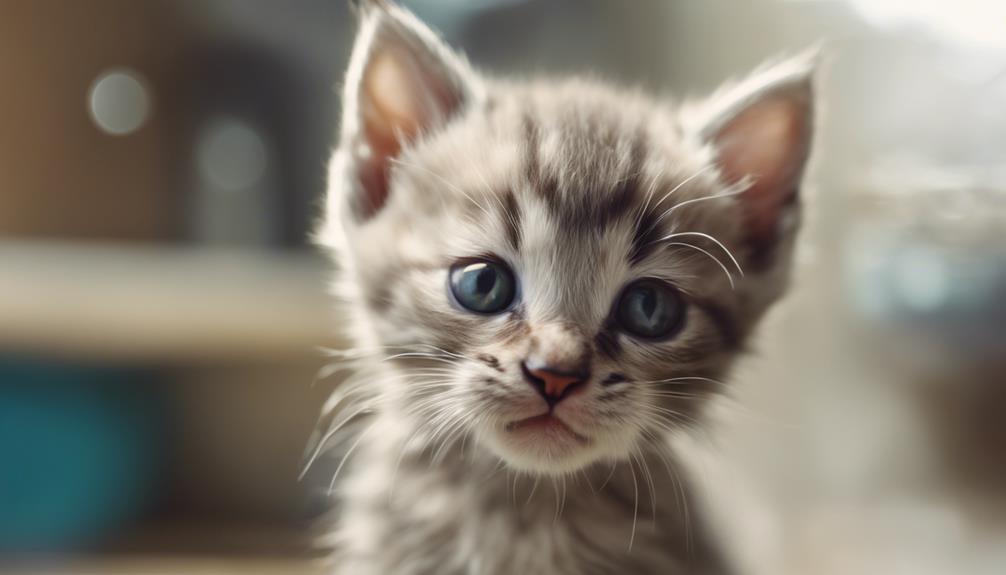
Symptoms indicative of fading kitten syndrome serve as crucial warning signs for identifying potential health concerns in newborn kittens. These symptoms include a loss of appetite, dull hair coat, weakness, fatigue, and a lack of vocalization.
Additionally, failure to gain weight or falling behind littermates can signal a red flag. It is essential to observe kittens' interactions and activities closely. Tracking their eating habits, weight gain, and elimination frequency is important for early detection of any issues.
Importance of Early Detection
Recognizing the significance of early detection in addressing fading kitten syndrome is paramount for ensuring the well-being of newborn kittens. Early detection allows for timely intervention and increases the chances of successful treatment. Here are four key reasons highlighting the importance of early detection:
- Prompt Medical Attention: Early detection enables quick veterinary assessment and appropriate treatment.
- Prevention of Deterioration: Identifying symptoms early can prevent the condition from worsening.
- Higher Survival Rates: Timely intervention increases the likelihood of survival for kittens affected by fading kitten syndrome.
- Reduced Suffering: Early detection minimizes the suffering experienced by kittens and improves their overall quality of life.
Monitoring Kittens' Health
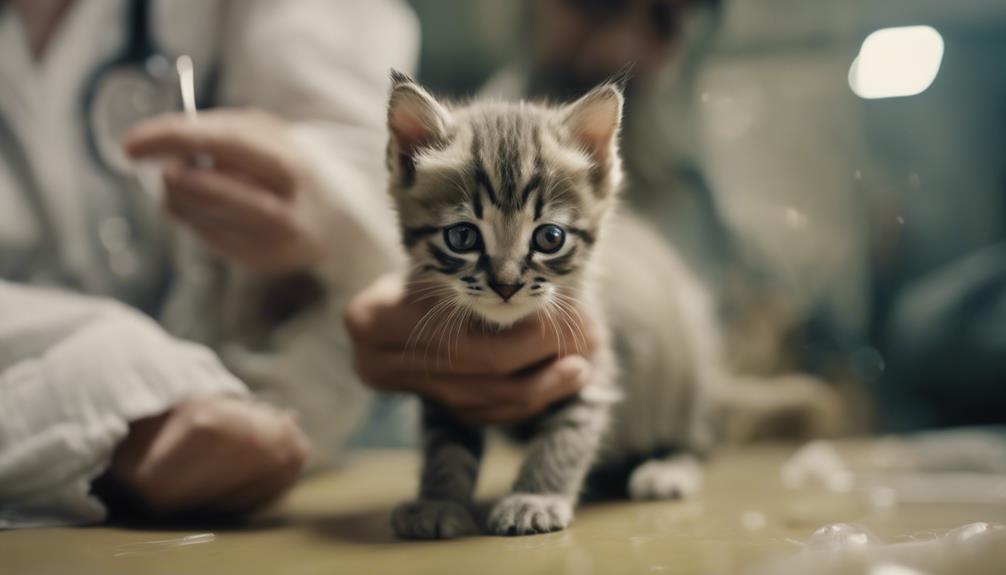
Understanding the importance of continuous monitoring in ensuring the well-being of newborn kittens, maintaining their health requires diligent observation and proactive intervention. Regularly monitoring kittens involves observing their behavior, interactions, and physical condition.
Tracking their eating habits, weight gain, and elimination frequency is crucial for detecting any signs of health decline early on. By closely monitoring these aspects, any deviations from normal kitten behavior can be swiftly identified, allowing for prompt intervention and medical attention if needed.
Additionally, monitoring kittens' health involves keeping them in a warm and clean environment, ensuring they receive adequate nutrition, and providing necessary care such as parasite treatments. Consistent monitoring and timely intervention play a vital role in safeguarding the health of newborn kittens.
Fading Kitten Syndrome Timeline
The progression of Fading Kitten Syndrome through the critical stages of a kitten's early life is essential to grasp for timely intervention and care. Understanding the timeline of this syndrome can help in identifying and addressing issues promptly. Here is a brief overview:
- Birth to 1 week: Kittens are most vulnerable during this period, requiring close monitoring for signs of weakness or failure to thrive.
- 1 to 4 weeks: This stage is crucial for weight gain and development; any deviations from the norm should be addressed immediately.
- 4 to 6 weeks: As kittens start exploring their surroundings, they may encounter new risks; vigilance is key to prevent any health downturns.
- 6+ weeks: By this stage, kittens should be gaining independence, but ongoing observation is still necessary for any lingering health concerns.
Lack of Prevention Methods
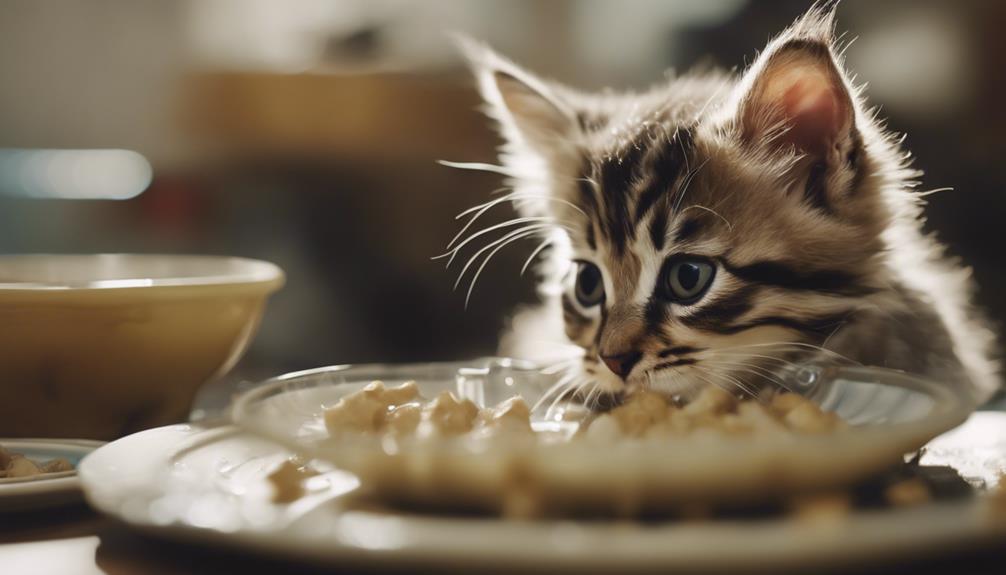
Progressing from the discussion on the Fading Kitten Syndrome timeline, the absence of established prevention methods for this condition highlights a critical challenge in safeguarding the health of newborn kittens. Currently, there are no specific preventative measures known to effectively ward off Fading Kitten Syndrome.
This lack of prevention methods underscores the importance of early detection and prompt intervention in managing the health of vulnerable kittens. Without defined strategies to prevent the syndrome, the focus shifts to vigilant monitoring, providing a nurturing environment, and seeking immediate veterinary attention at the first signs of illness.
While researchers continue to explore potential preventative measures, caregivers must prioritize proactive care and swift action to support the well-being of newborn kittens susceptible to this condition.
Emergency Care for Sick Kittens
In addressing the urgent needs of sick kittens, immediate veterinary intervention is paramount for ensuring their well-being and recovery. When faced with a sick kitten requiring emergency care, here are crucial steps to take:
- Assess the Situation: Evaluate the kitten's symptoms and overall condition.
- Keep Warm: Maintain the kitten's body temperature by providing a warm environment.
- Hydration: Ensure the kitten stays hydrated by offering water or a rehydration solution.
- Seek Veterinary Care: Contact a veterinarian promptly for professional assessment and treatment.
Warming Methods for Hypothermia
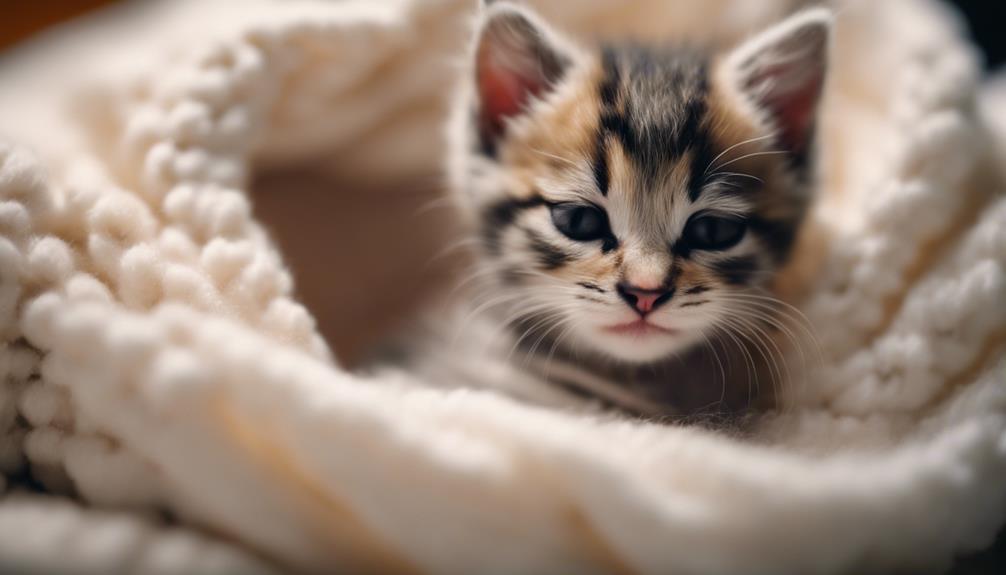
When caring for a sick kitten with hypothermia, maintaining appropriate body temperature is critical for their recovery and well-being. To warm a hypothermic kitten effectively, consider the following methods:
| Warming Methods | Description | Tips |
|---|---|---|
| Heating Pad | Place a heating pad on low under half of the kitten's area. | Monitor closely to prevent overheating. |
| Warm Water Bottle | Fill a bottle with warm water, wrap it in a towel, and place it near the kitten. | Regularly check the temperature to ensure it remains warm. |
| Warm Towel Wrap | Wrap the kitten in a warmed towel to provide gentle heat. | Reheat the towel as needed to maintain warmth. |
These methods can aid in raising the kitten's body temperature gradually and improving their overall condition.
Boosting Blood Sugar Levels
Boosting blood sugar levels in kittens experiencing fading kitten syndrome is crucial for their immediate health and well-being. Here are some effective methods to help increase blood sugar levels in these vulnerable kittens:
- Rubbing Sugar Water on Gums: Applying sugar water to the kitten's gums can provide a quick source of glucose to boost their blood sugar levels.
- Feeding High-Calorie Supplements: Providing high-calorie kitten milk replacers or glucose gel can help elevate blood sugar levels.
- Offering Small, Frequent Meals: Dividing their daily food intake into smaller, more frequent meals can prevent blood sugar drops and maintain stable levels.
- Monitoring Blood Sugar Levels: Regularly checking the kitten's blood sugar levels with a veterinarian can ensure they are within a healthy range and adjust interventions as needed.
Veterinary Intervention Importance
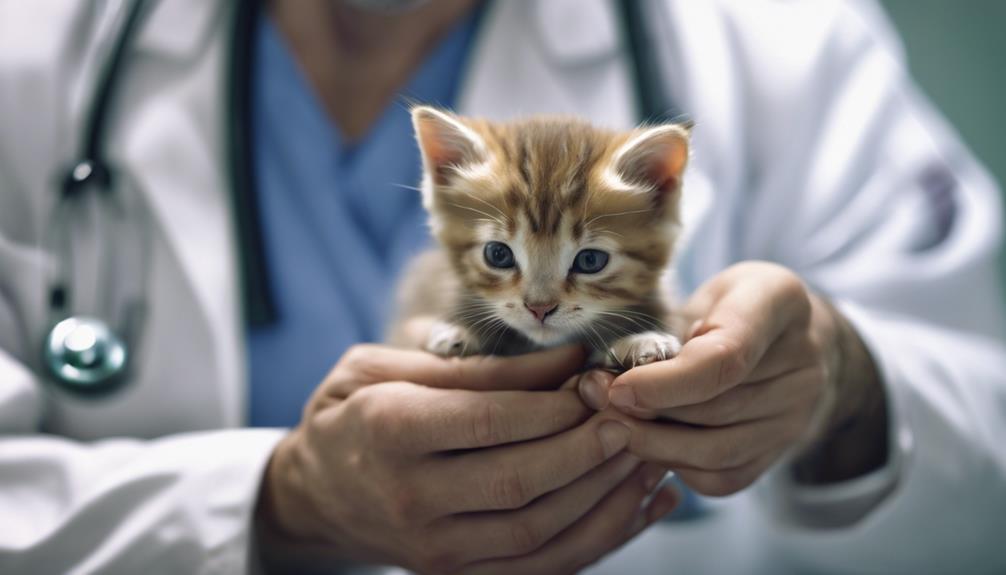
Addressing the critical necessity of timely veterinary intervention is paramount when managing the health of kittens affected by fading kitten syndrome. Seeking professional veterinary care promptly can significantly impact the outcome for these fragile animals. Veterinarians are equipped with the knowledge and tools necessary to diagnose and treat the underlying causes of fading kitten syndrome. Their expertise can help stabilize the kittens' health and provide the best chance for recovery. Below is a table emphasizing the importance of veterinary intervention in the treatment of fading kitten syndrome:
| Veterinary Intervention Importance | |
|---|---|
| 1. Early Diagnosis | |
| 2. Tailored Treatment Plans | |
| 3. Monitoring Vital Signs | |
| 4. Nutritional Support | |
| 5. Emergency Care |
Medications and Treatments
In the management of fading kitten syndrome, a comprehensive approach involving specific medications and treatments is crucial to improving the health outcomes of affected kittens. When addressing fading kitten syndrome, veterinarians may consider the following medications and treatments:
- Antibiotics: These can assist in treating belly button infections in kittens.
- Parasite Treatments: Necessary to combat any parasitic infestations that may be contributing to the kitten's decline in health.
- Fluid Therapy: Administered to combat dehydration and maintain proper hydration levels in sick kittens.
- Nutritional Support: Providing essential nutrients and calories through specialized kitten formulas to help boost the kitten's strength and overall health.
Care Considerations for Sick Kittens
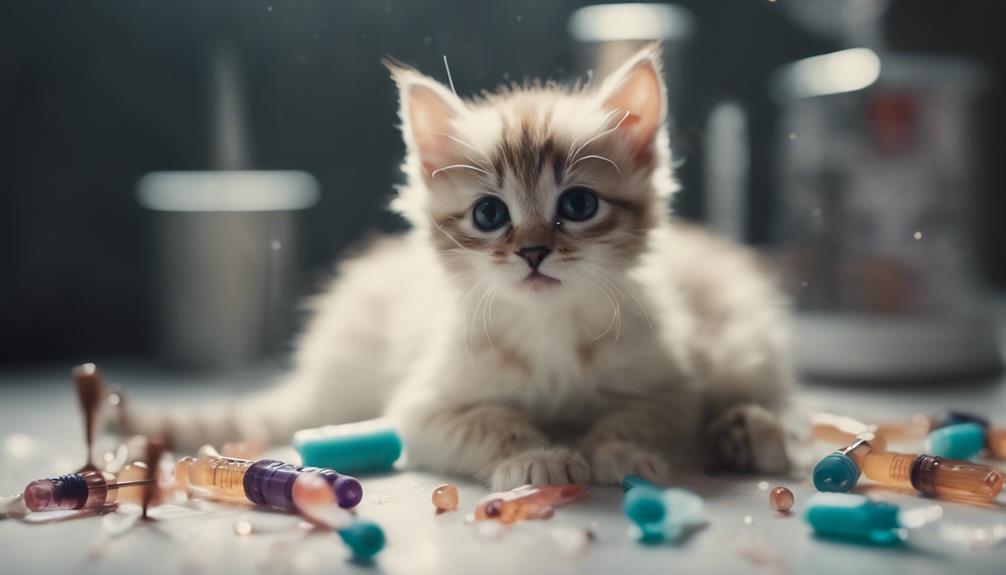
When caring for sick kittens affected by fading kitten syndrome, it is imperative to provide meticulous attention to their specific needs and health requirements. These kittens require specialized care to improve their chances of survival. Here are some essential care considerations for sick kittens:
| Care Considerations | Description |
|---|---|
| Hydration | Ensure kittens are adequately hydrated through oral or subcutaneous fluids. |
| Nutrition | Provide high-quality kitten milk replacer and monitor feeding closely. |
| Temperature Regulation | Maintain a warm environment using heating pads or warm towels. |
| Cleanliness | Keep the kittens and their environment clean to prevent infections. |
| Veterinary Attention | Seek immediate veterinary care for proper diagnosis and treatment. |
Promoting Newborn Kitten Health
Promoting optimal health in newborn kittens is essential for their overall well-being and development. To ensure the well-being of newborn kittens, consider the following tips:
- Nutrition: Providing a high-quality kitten milk replacer can support their growth and development.
- Hygiene: Keeping their environment clean and warm helps prevent infections and promotes comfort.
- Socialization: Encouraging positive interactions with humans and littermates supports their emotional well-being.
- Veterinary Care: Regular check-ups and vaccinations are crucial for monitoring their health and preventing illnesses.
Frequently Asked Questions
Can Fading Kitten Syndrome Affect All Kittens Equally, or Are Certain Breeds More Susceptible?
Certain breeds may have higher susceptibility to fading kitten syndrome due to genetic predispositions. However, all kittens can be affected. Close monitoring, early detection, and prompt veterinary care are crucial in combating this syndrome and ensuring kitten health.
Are There Any Long-Term Effects on Kittens Who Survive Fading Kitten Syndrome?
Surviving kittens of fading kitten syndrome may experience long-term health challenges, including growth and developmental delays, weakened immune systems, and potential recurring health issues. Regular veterinary check-ups and attentive care are crucial for their ongoing well-being.
How Can a Kitten's Environment and Living Conditions Impact Their Likelihood of Developing Fading Kitten Syndrome?
The environment and living conditions of kittens can impact the likelihood of developing fading kitten syndrome. Factors such as hygiene, temperature regulation, stress levels, and nutrition play critical roles. Maintaining a clean, warm, stress-free, and well-fed environment is essential.
Are There Any Specific Dietary Recommendations or Supplements That Can Help Prevent Fading Kitten Syndrome?
While there are no specific dietary recommendations or supplements proven to prevent fading kitten syndrome, ensuring kittens receive proper nutrition, maternal care, and veterinary monitoring can help support their overall health and reduce the risk of developing this condition.
Is There Ongoing Research or Studies Being Conducted to Better Understand and Prevent Fading Kitten Syndrome in the Future?
Ongoing research aims to enhance understanding and prevention of fading kitten syndrome. Studies focus on identifying underlying causes, improving early detection methods, and developing preventive measures. Collaborative efforts within the veterinary community strive to safeguard the health of newborn kittens.
What Are the Risks of Fading Kitten Syndrome When Kittens Leave Their Mom?
When kittens leaving mom, veterinarian recommendations are vital to prevent fading kitten syndrome. The risks include insufficient nursing, poor immune system development, and lack of proper care. A veterinarian can offer advice on proper nutrition and monitoring to ensure the kittens’ health after they leave their mother.
Conclusion
In conclusion, understanding Fading Kitten Syndrome is essential for identifying and addressing the symptoms that can endanger the health of newborn kittens.
By being vigilant and proactive in monitoring their well-being, recognizing early signs of distress, and seeking prompt veterinary care, we can strive to improve the outcomes for kittens affected by this enigmatic syndrome.
Through knowledge, observation, and timely intervention, we can make a difference in safeguarding the delicate lives of these vulnerable felines.




